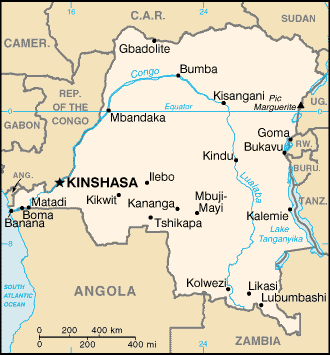News from DR Congo, Zambia and Nigeria
In DR Congo, the training of 20 civilian and military personnel is in progress in France, to show that that country is dedicated to enforcing the rule of law. This training is an important step in light of recent events in Katanga province: 49,000 people have fled fighting there between the Congolese army and the Mayi-Mayi rebel militia.
Humanitarian groups such as Medecins Sans Frontiers are having difficulty accessing those regions to provide aid. The International Crisis Group says that the situation is as bad as in Ituri and the Kivus but is not garnering comparable attention.
"'The number of displaced in central and northern Katanga now exceeds 100,000,' said Anne Edgerton, head of the United Nations Office for the Coordination of Humanitarian Affairs (OCHA)....'Their most immediate need is clothing,' she said. 'Many arrived with clothes rotting off their bodies.'"
The Kaiser Foundation Daily HIV/AIDS Report cites a Guardian article examining the spread of HIV/AIDS in Zambia's Lake Mweru region. The estimated 25% prevalence rate is credited to a population increase over the past 30 years due to mining activities in that area and an influx of people to that region, coming from DR Congo, Nigeria, Malawi, Zimbabwe and South Africa.
For the sake of comparison, here are respective HIV prevalence rates for those countries according to data accrued by Global Health Facts.Org:
DR Congo: 4.2%
Malawi: 14.2%
Nigeria: 5.4%
South Africa: 21.5%
Zambia (entire country): 16.5%
Zimbabwe: 24.6%
As a counterpoint to these facts, Kaiser also mentions a segment of The World that talks about the changing attitudes of Zambians toward HIV testing: as anti-retroviral therapy (ART) becomes more available, people's optimism toward survival increases and they are more likely to get tested.
As reported by IRIN, Zambia faces funding shortages for food rations in refugee camps. The World Food Program (WFP) and the United Nations High Commission for Refugess(UNHCR) are both concerned that, following three months of reduced food rations due to rising prices of maize and a lack of funding commitment for 2006, that the situation both in refugee camps and in other regions where refugees in settlements had been cultivating crops prior to drought, is dire.
According to the report in the first link above, "Ahmed Said Farah, UNHCR regional representative in Zambia, warned that there 'will be increased morbidity, mortality and stunted growth' among refugees should further funding not be forthcoming. 'Social problems, such as prostitution and child labour, will increase and refugees may become uncontrollable as a result of the food cuts.'"
In Nigeria, the National Action Committee on AIDS announced that it would double the number of government centers providing ART, increasing recipients from 40,000 to 250,000. Nigeria has approximately 3.5 million people living with HIV/AIDS. The plan will be funded primarily by the Global Fund to Fight AIDS, Tuberculosis, and Malaria and the US government (PEPFAR).
I also read somewhere that Nigeria plans to free some 25,000 detainees, and this IRIN article says that some of those detainees have been waiting 10 years to go to trial. This report includes details of the deplorable state of prisons there, particularly for death row inmates.
I am reminded of my stay in Rwanda in 2001, seven years after the war and genocide there, and a conversation with a woman who was conducting dissertation research through interviews with female detainees in prisons. Most women there were in prison not for crimes related to the genocide but rather because they had sought abortions.
There were programs to distribute towels to the inmates because the prisons leaked and in the overcrowding, they stood for long periods in pools of water and were developing foot rot. Most had been in prison for seven years, since the war and genocide in 1994, and were awaiting trial. Because the incredible number of prisoners overwhelmed the national court system, the gacaca (ga-cha-cha) system was developed, a "new system of participatory justice (a reworking of the traditional community conflict resolution system)," such that prisoners' fates could be decided more quickly. In most cases, this meant that many were let off with time served plus some years of community service.
Additionally, the female prisoners told the researcher that their single biggest need was for underwear to hold their sanitary napkins, and the researcher's mother appealed to her church to raise funds for that purchase. In the link above, this need is mentioned by a Nigerian female detainee, who says, "we have to share one [sanitary napkin] between two women every month, or even every two months."


0 Comments:
Post a Comment
<< Home